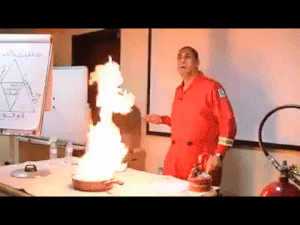Why does fire go out?

Can someone explain what's happening in this image?
How come when it's covered quickly, the fire still burns, but when it's covered slowly the fire is extinguished?
No vote yet
1 vote
Easy Math Editor
This discussion board is a place to discuss our Daily Challenges and the math and science related to those challenges. Explanations are more than just a solution — they should explain the steps and thinking strategies that you used to obtain the solution. Comments should further the discussion of math and science.
When posting on Brilliant:
*italics*or_italics_**bold**or__bold__paragraph 1
paragraph 2
[example link](https://brilliant.org)> This is a quote# I indented these lines # 4 spaces, and now they show # up as a code block. print "hello world"\(...\)or\[...\]to ensure proper formatting.2 \times 32^{34}a_{i-1}\frac{2}{3}\sqrt{2}\sum_{i=1}^3\sin \theta\boxed{123}Comments
Smothering an oil fire in a frying pan is not something that works best in haste. Firemen routinely give demonstrations on how it's supposed to be done, and one of the worst ways to do is is to "slap" the top on. Slow is better. Now, the physics: The ignition temperature of cooking oil can be as low as 300 to 350 degrees, which is easily reached with a frying pan on the stove. Hence even if you were smother the oil fire, if the temperature is not allowed to drop, it can spontaneously re-ignite.
Let's look at the video. The timing of it appears to have been perfected by a magician for effect. Slapping the lid on top doesn't hardly even give the fire enough time to use up all the oxygen when the lid is slapped on, so when the lid is pulled off suddenly, the fire billows out to great effect! Then he "carefully smothers" the fire by sliding the lid over it, so that apparently putting out the fire seems successful. But of course, the video is cut short (after which it loops) before it shows the moment the oil spontaneously re-igniting. A longer time is needed to let the oil cool down below ignition temperature.
In contrast, even paper has a far higher ignition temperature, so that once a paper fire is smothered, and there are no embers, it's quite difficult to make it re-ignite spontaneously. Here's where "one's intuitive experience with ordinary burning paper" serves poorly in dealing with cooking oil fires.
Log in to reply
I don't think the fire re-ignites. Here is what seems to be the source video for the gif.
We can see that the fire does stay out for 5 seconds before the video ends. Also, it seems to be a firefighting demonstration (we can see a fire extinguisher in the back and the guy seems to be wearing a firefighting uniform). So it seems unlikely this is a trick.
Log in to reply
True. The frying pan is on a table, not on the stove.
Nevertheless, never trust an oil fire not to spontaneously re-ignite. Like a trick birthday cake candle.
As for me this sounds like a clearly performed trick. When the lid is closed suddenly,it cuts off the oxygen supply only for a few fractions of second but when the lid slides over slowly, it prevents the supply for few seconds. As a result the fire sets off and it is once turned off it cannot revive again.
Log in to reply
Yes, that is related to what's happening. As Michael said
Though, if you consider the "slow close" scenario, the supply was completely cut off only for a split second. It's about the amount of oxygen that is left in the pan that can fuel the fire.
When it is covered quickly the time period of covering fire is reduced due to which the gas such as carbon dioxide is not produced in that much amount to extinguish but when dragged slowly produces such gasaes which extinguis fire by cutting supply of oxygen
There's is very less oxygen in the pan, When the red man put the pan onto the fire,fire extinguishes due to the sudden loss of contact from air(oxygen).
Log in to reply
Even I had first attempted that and then I realized that its not what we are requiring.
Because...u fast forward and repeated the clip when he is about to cover up the lid...?